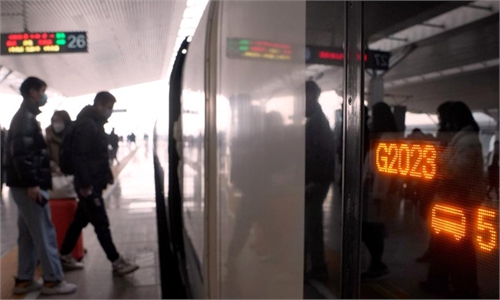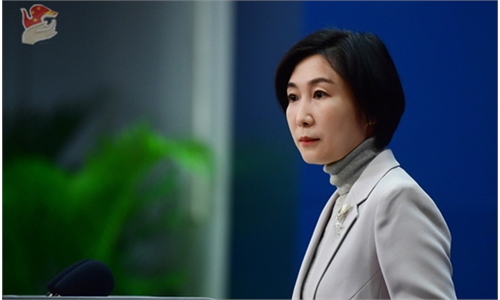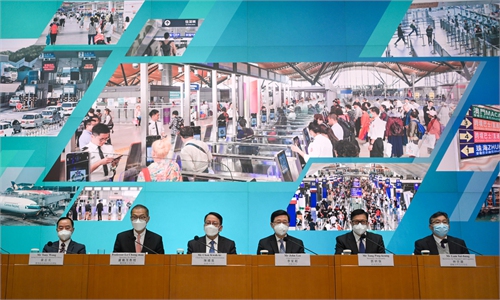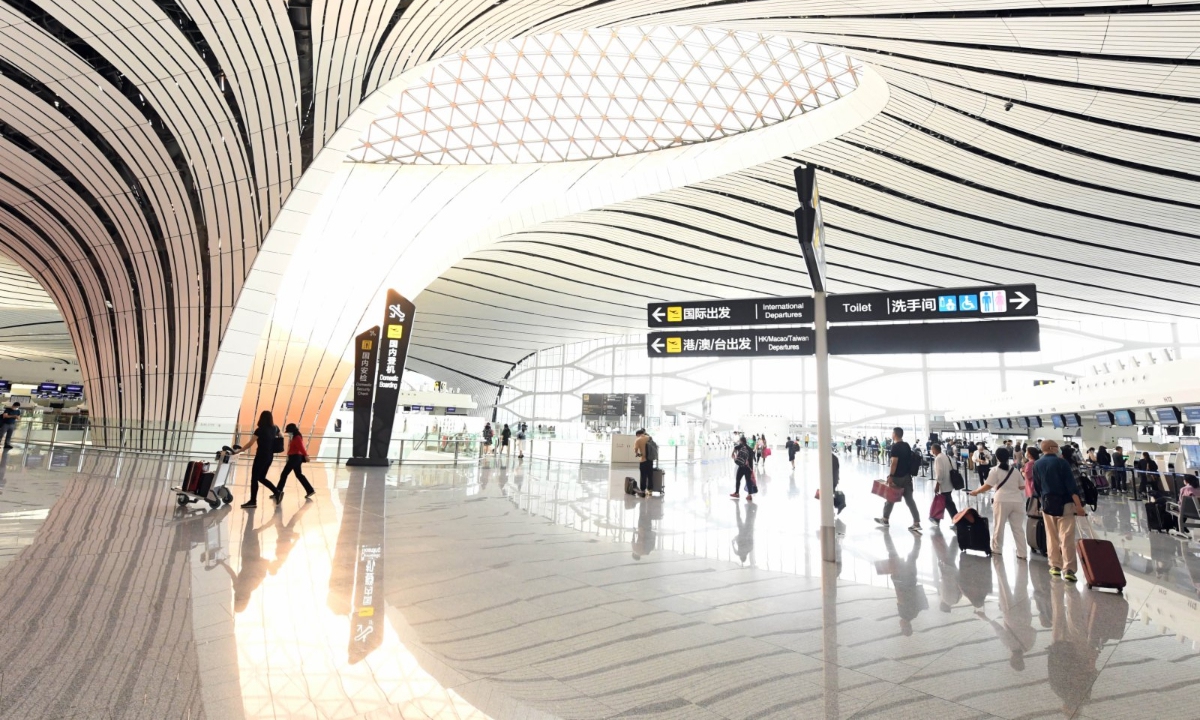
Beijing Daxing International Airport Photo: Xinhua
As some countries join the club of imposing travel restrictions on arrivals from China, scientists from all over the world believe such a decision was not made based on science, and is logistically cumbersome, and a toxic trend that hurdles the global trend of returning to pre-pandemic normalcy.
China has been actively monitoring, as well as sharing its COVID-19 information with relevant international bodies, said Chinese virologists, noting that certain countries' restrictive measures are out of political motive, and the measures will end in vain and waste precious time and energy. Such "backward' moves will also dampen people-to-people exchange in post pandemic era, they said.
The EU on Wednesday "strongly encouraged" its 27 member nations to require a negative COVID-19 test for travelers boarding flights from China to the region, marking the latest development of certain regions' "political farce" of imposing travel restrictions on arrivals from China.
The US, Japan and South Korea are among the countries that announced restrictions on travelers from China, citing concerns that the current surge of COVID-19 cases in China could lead to emergence of new variants, and that "reduced testing and case reporting in the PRC and minimal sharing of viral genomic sequence data could delay the identification of new variants of concern if they arise," as the US CDC previously said.
Spokesperson of China's Ministry of Foreign Affairs has for days urged countries to base their COVID response measures on science and not to resort to political manipulation or discriminatory measures against China. Mao Ning, spokesperson of the ministry, said on a Thursday conference that China believes countries' COVID-19 response measures need to be fact-based, science-based and proportionate. They should not be used for political manipulation, there should not be discriminatory measures. She made the comment as a response to Japanese government's request that passengers from China should present a 72-hour valid negative COVID-19 test prior to departure and take a nucleic acid test upon arrival, and similar measures from EU.
Mao said that China also reminded its citizens who are planning to travel abroad to check their health conditions and the entry requirements of their destination in advance to avoid disruption to their itinerary.
Several public health experts and virologists from China and abroad told the Global Times that from a scientific perspective, danger of new variants emerging from China is very little, and that travel restrictions are not an effective means of controlling the spread of the coronavirus at this stage. Such stringent requirements for travelers can be cumbersome, discriminatory and politically toxic.
"In general, widespread expansion of infection is likely to lead to the emergence of novel mutant strains … However, the strain of coronavirus now prevalent in China is the Omicron subtype that has been prevalent abroad,'' Kaio Kitazato, a virologist from the Department of Biomedical Sciences, Nagasaki University, told the Global Times on Wednesday.
Kitazato said analysis of specimens submitted to international database GISAID by China shows China's COVID outbreak is being driven by existing strains and there is no evidence of new important variants. A more severe variant is unlikely to appear in China, but it's critical to closely monitor the situation.
Echoing Kitazato, James Wood, a professor from the School of Population Health of the University of New South Wales, told the Global Times on Wednesday that at present, more transmissible variants are circulating globally, so there does not appear to be an immediate risk of new variants of interest or concern that is occurring in China.
Masahiro Kami, a physician and head of the nonprofit Medical Governance Research Institute, told the Global Times that based on the current situation in China, he believes the infection has already peaked in the country. He also whisked off the concern on recently prevailing XBB variant, as its virulence is equal to that of Omicron.
Although new variants are likely to emerge, they will probably still be subvariants of Omicron, and as long as travelers are inoculated, countries such as Japan and South Korea have no need to be concerned.
Kami believes it is unnecessary for Japan to impose restrictions on travelers from China, as the country has not witnessed an emergence of toxic and concerning mutation of the coronavirus.
Mao also said on Thursday that according to a WHO release on January 4, the genome data of the virus provided by China's National Health Commission shows that the predominant variant in China is in line with the genome sequence from travelers from China infected with the virus submitted by other countries, and no new variant or mutation of known significance was noted.
Commenting on countries' travel curbs, Jeffrey Shaman, an epidemiologist at Columbia University, told the Global Times through an e-mail that he does not believe that the travel curbs will help stop "the danger" claimed by some countries "because the virus is already everywhere and as other variants have shown, they move around."
Kitazato said that "travel restrictions can partially inhibit the importation and spread of the virus, however, in today's globalized economy, a closed country is not possible, and as long as there is movement of people, it is impossible to completely avoid virus importation if travel restrictions are imposed only on specific countries."
A Chinese virologist close to the country's CDC who preferred to remain anonymous called the travel restrictions discriminatory and a waste of time and resources. "From the science perspective, it is cumbersome and waste of time, resources."
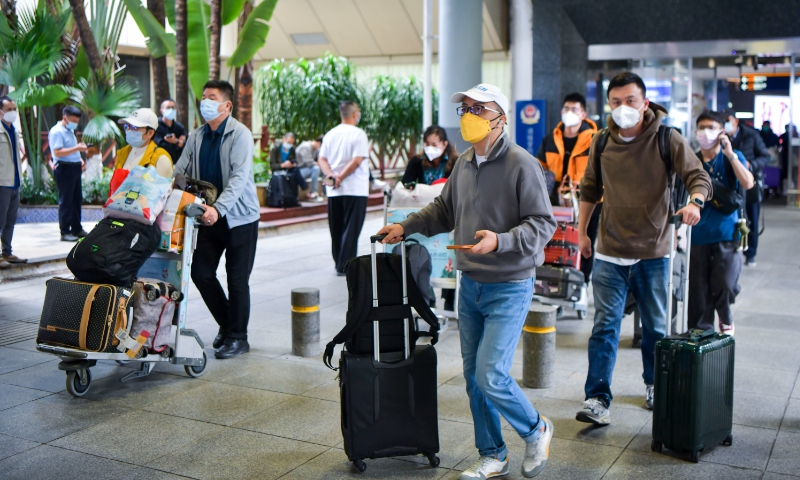
Passengers walk out of Haikou Meilan International Airport on December 9, 2022. Photo: VCG
Actively sharing
The CDC expert said that China is closely monitoring prevailing variants in the country, and has currently found no concerning variant. "If we found anything alarming, we would for sure share with others, nobody wants to relive the past three years anymore."
The WHO on Wednesday said that China's COVID-19 data "is not giving an accurate picture of the situation there and underrepresents the number of hospitalizations and deaths from the disease."
In response, Mao said since the COVID-19 outbreak, China has been sharing relevant information and data with the international community in an open and transparent manner, and has shared the genome sequence of coronavirus timely. China has been keeping close contacts and cooperation with the WHO over the years, said Mao.
After recently refining its COVID response measures, China has held several technical meetings with the WHO, Mao said, citing a meeting on December 9 in which China's National Health Commission (NHC) informed the WHO of the containment and treatment of the disease in China; another meeting on December 30 in which Chinese experts shared with WHO in detail the background and basis for the policy refinement and provided a comprehensive update on the current situation in China, and a meeting on Tuesday in which China provided a comprehensive update on the recent developments and COVID variants in China. In response to whether China has been playing down the number of deaths caused by COVID, Liang Wannian, head of the expert panel overseeing the national COVID-19 response, said last week that it is hard to get an accurate grasp of the death rate when the infection spreads fast. Such a judgment can only be made after the infection ebbs away, and the current stage should focus on preventing severe and fatal cases, media reported.
The anonymous virologist also believes that it is China which is under great risk of imported new variant from other countries than the other way around.
The Chinese Embassy in the US issued a warning on Wedensday that Omicron's subvariant XBB.1.5 has become the fastest prevailing variant in the US, and reminded Chinese citizens in the country to be cautious.
Kitazato said that experts are concerned about the strong immune evasion ability of XBB.1.5, a highly contagious "recombinant" variant that spawned from two different BA.2 variants. It is related to the XBB variant, which was previously behind a COVID surge in Singapore. XBB has been listed as the "worst new coronary mutation strain in existence" in terms of immune evasion ability, but the analysis suggests that XBB.1.5 will surpass it.
Not only scientists, but people from all over the world are also appalled by certain countries' move of restricting passengers from China, saying it's preventing the world from returning to pre-pandemic normalcy.
In a statement sent to the Global Times on Wednesday, The International Air Transport Association (IATA) said that the restrictive measures have proven ineffective and it urged governments to base their decisions on "science facts" rather than "science politics."
"Several countries are introducing COVID-19 testing and other measures for travelers from China, even though the virus is already circulating widely within their borders. It is extremely disappointing to see this knee-jerk reinstatement of measures that have proven ineffective over the last three years," said the statement from IATA, citing Willie Walsh, IATA Director General.
Unlike the US, Japan and some other nations, most Southeast Asian governments are choosing to impose no new restrictions on the expected influx of Chinese nationals. Cambodian Prime Minister Samdech Techo Hun Sen said this week that his country was an "attractive destination" for Chinese people and would "not require Chinese people to do anything, just to come as normal tourists," according to a report in the Khmer Times.
"As the world is eager to return to pre-pandemic normalcy, some countries are going against the trend and science. Now it is the time for countries to join hands to boost normal exchange and keep close eye on COVID-19 control, not for another round of finger pointing and political farce," said the anonymous virologist.
